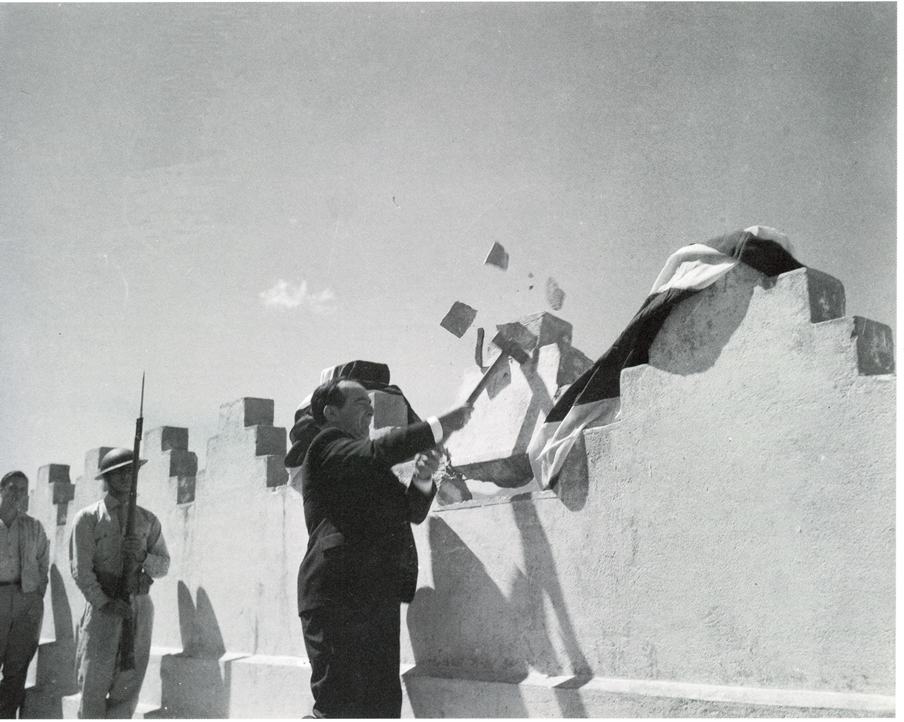When Roberto Güell decided to invite his former enemies of war to join his organization of retired soldiers, it wasn’t the first time he realized their differences weren’t worth fighting over. The first time came after the Battle of Tejar during Costa Rica’s civil war of 1948. More than 200 men were killed in this battle, southwest of Cartago, and when Güell and his fellow soldiers were ordered to bury the bodies of the dead, they found they could not distinguish between their men and those of their enemy. “Everyone had their regular clothes on, and they looked the same.
So we had to bury everyone together. After being so divided, we had to unite the men, and bury them together,” said Güell, president of the National Association of Ex-Combatants.
“We always wanted a country that didn’t require the use of arms to move forward. Arms don’t bring culture. They don’t bring education. They don’t bring food to the people,” explained 76-year-old Güell, who at age 18 was a commander in the revolutionary army. “(The reason for the war) was a lack of intelligence, and a lack of the spirit of conciliation. So the war arrived, and there may have been good intentions. But they were wrong.
The war could have been avoided if there had been more willpower,” he said. Approximately 600 soldiers died in Costa Rica’s civil war, which lasted just over five weeks. Although a small number in comparison to the wars of other countries, these deaths were significant considering Costa Rica’s population was only 600,000 at the time, Güell pointed out. Including civilians, the death toll was more than 2,000.
THE war erupted after the elections of 1948, when former President Rafael Ángel Calderón Guardia (1940-1944) lost his second bid for President. He claimed fraud, ballots went up in flames (preventing a recount), and the Calderón-dominated legislature annulled the election results. Ten days later – March 10, 1948 – a revolutionary army led by José “Pepe” Figueres fought back. But even during the 40-day lapse of bellicosity in the country’s tradition of peace, the spirit of peace pervaded, according to Güell. “I was one of the people who watched the prisoners,” he said.
“We treated them humanely and we shared a lot of time. We would talk, and many of them ended up saying, ‘why are we fighting, we are all patriots. We are equal.’ We were really fighting for the same thing – our country.” After Figueres’ men won, he declared an end to the country’s military, and formally followed up with the declaration in the 1949 Constitution.
NOW that the battle lines have been erased, and Costa Rica’s army has been abolished, the soldiers who once faced off in battle are again fighting for a common cause. The purpose of the Association of Ex-Combatants is to fight and lobby for “values, human rights and dignity, and public liberties,” Güell said.
Many of its more than 2,500 members, in chapters around the country, remain fierce supporters of the men for whom they originally fought – Calderón and Figueres, who went on to become President on three occasions (1948-1949, 1953-1958, 1966-1970). “Costa Rica had two great leaders, Dr. Calderón Guardia and Dr. Figueres. There are no other leaders of this epic who have defined modern Costa Rica,” Güell said.
Calderon’s legacy includes the establishment of minimum wage, paid vacations, unemployment compensation, progressive taxation, socialized medicine, codifying workers’ rights, and founding of the University of Costa Rica. Figueres consolidated Calderón’s social reforms and added his own, including giving suffrage to women and blacks (1949), creating the Supreme Elections Tribunal, nationalizing banks and insurance, and outlawing the army. “This is the beautiful thing, that Figueres didn’t arrive and destroy the beautiful (legacy) of Calderón. But still, we are critics of each other and supporters at the same time,” said Güell, a father of six, grandfather of 12, and great-grandfather of three.
In regular monthly meetings, association members determine how to pressure the government to support the causes they feel fit the ideals of the famed leaders – from opposition to foreign oil exploration to fighting for labor rights. “Our goal is to maintain honesty in the administration of the country and to maintain the institutions of the state in service to the people,” Güell said. One of the biggest offenses the association is now battling is the recent corruption scandals in Costa Rica – particularly painful because accusations have been made against the sons of two of their leaders.
Rafael Ángel Calderón Jr. and José María Figueres – who were also Presidents of Costa Rica, from 1990-1994 and 1994-1998, respectively – are both alleged to have received questionable payments in connection with government contracts with private companies. Calderón Jr. is in preventive detention in the penitentiary La Reforma, and Figueres, who is in Switzerland, agreed last week to return to Costa Rica in December to testify before the Legislative Assembly.
“MORE than 50 years later, many of the values we fought for, on both sides, are being challenged. So we are fighting for them again,” Güell said.






